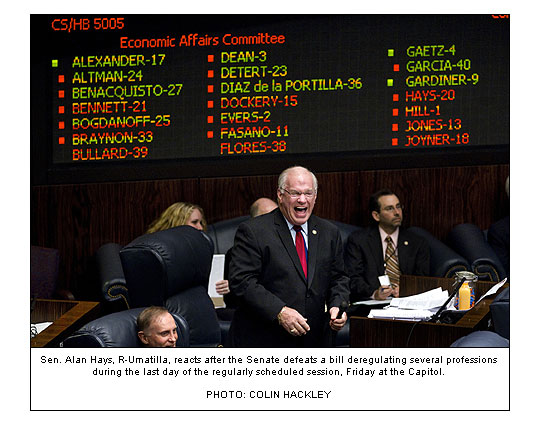Century Man Shot Outside Highway 97 Piggly Wiggly; Atmore Man Charged (With Photo Gallery)
May 9, 2011
 A North Escambia man is recovering after being shot Sunday afternoon just outside of the Piggly Wiggly in Davisville, and an Atmore man was arrested after waiting for deputies to arrive.
A North Escambia man is recovering after being shot Sunday afternoon just outside of the Piggly Wiggly in Davisville, and an Atmore man was arrested after waiting for deputies to arrive.
Family members identified the victim as 45-year old Garland Rodney Johnson of West Highway 4 Century. He was shot once in the abdomen with a .22 caliber revolver. Johnson was airlifted by LifeFlight to Baptist Hospital in Pensacola in serious condition.
Gary Winston Smith, 57, of Rockaway Creek Road, Atmore, was arrested at the scene charged with aggravated battery in connection with the shooting. He was released from the Escambia County Jail Monday on $10,000 bond.
For more details on this story, click here for an update.
Authorities believe he shooting resulted from an ongoing feud between the two men over a female.
For a photo gallery from the scene, click here.
About 4:20 p.m., Johnson pulled into the parking lot of the Piggly Wiggly, parking his Nissan several feet from the store, witnesses said. He approached the store’s sidewalk, where Smith was standing near his Ford Mustang, which was parked directly adjacent to the sidewalk. The two men began to argue, according to a witness. That’s when Smith allegedly fired a single shot from a small Derringer-type revolver in the direction of the parking lot into Johnson’s abdomen. The wound was believed to be through-and-through, with the bullet continuing into the crowded parking lot. Deputies were unable to locate the bullet.
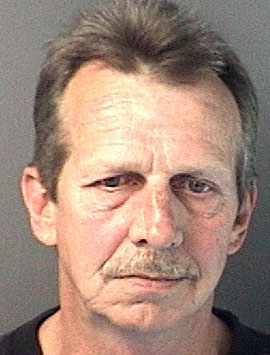 After being shot, Johnson walked inside the store where 911 was called. Smith, according to witnesses, waited in the store’s parking lot about 15 to 20 minutes for deputies to arrive. When the deputies approached him, Smith (pictured) reportedly put his hands in the air, surrendered and admitted to the shooting.
After being shot, Johnson walked inside the store where 911 was called. Smith, according to witnesses, waited in the store’s parking lot about 15 to 20 minutes for deputies to arrive. When the deputies approached him, Smith (pictured) reportedly put his hands in the air, surrendered and admitted to the shooting.
The incident remains under investigation by the Escambia County Sheriff’s Office. The Walnut Hill Station of Escambia Fire Rescue and Atmore Ambulance also responded to the call.
For a photo gallery from the scene, click here. The photo gallery shows the complete scene, the victim being airlifted, the suspect being arrested, a crime scene investigator at work and vehicles being searched.
Pictured top: A North Escambia man was shot just outside the Piggly Wiggly on Highway 97 in Davisville. Pictured inset: This NorthEscambia.com exclusive photo shows Gary Winston Smith of Atmore being arrested in connection with the shooting. Pictured below: The victim, Garland Rodney Johnson of Century, was transported by LifeFlight to Baptist Hospital in Pensacola. NorthEscambia.com photos, click to enlarge.
In Depth: 2011 Session Changes Medicaid And Teacher Pay, Cuts Budget
May 9, 2011
The Legislature on Saturday ended a session of potentially historic measures – dominated by the biggest need to cut spending in a generation, but marked too by the most far-reaching overhaul in decades in how government provides health care to the poor and a fundamental change in how teachers are paid.
The 2011 legislative session, the first for new Republican Gov. Rick Scott, was also notable as a session when unions were under the microscope – many would say under attack – in a way they haven’t been in years.
And, it was notable for what it didn’t do: crack down on illegal immigration in a year when tea party voters around the country were demanding that states do that.
For Scott, who went into the legislative season imploring lawmakers to focus laser-like on creating jobs, it was a session of partial successes, with legislators pulling a corporate income tax cut out of the hat at the end of the session – though nowhere near the size cut the new governor sought. The Legislature also reduced regulations, particularly on the environmental and growth management front, and set the stage for loosening the state’s grip on businesses that say they want to expand but have been stymied by red tape.
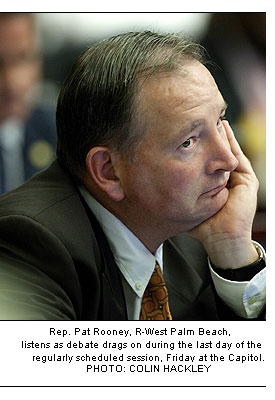 But in failing to pass an Arizona-style immigration law on which the governor campaigned, lawmakers gave Scott a reminder that changing the laws may not be as easy as his ubiquitous campaign TV commercials implied it would be.
But in failing to pass an Arizona-style immigration law on which the governor campaigned, lawmakers gave Scott a reminder that changing the laws may not be as easy as his ubiquitous campaign TV commercials implied it would be.
There were other major themes that ran though a session that weren’t surprising in a year in which Republicans enjoyed their largest House majority in modern times, an 81-39 advantage and a super majority in the Senate as well. The GOP pressed its new supermajority – delivered in 2010 as part of the national Republican and tea party tide – by passing contentious bills tightening restrictions on abortions and trying to strengthen gun rights, red meat for the GOP base.
Republican domination of the Legislature also made it easy for lawmakers to send a strong message on the federal health care law – anger over which many observers say got Republicans their new hypermajority. The Legislature passed what may turn out to be a largely symbolic protest to refuse to participate in the nation’s law.
Coupled with Senate President Mike Haridopolos’ eye on the GOP primary for a U.S. seat, that sense that much of the session was a fight against Washington Democrats and a play to national tea party talking points – on immigration, on union issues, on cutting spending – made the 2011 session the most politically tinged and openly partisan in at least a decade.
“It’s a tea party train wreck,” a frustrated Rep. Mark Pafford, D-West Palm Beach, one of several Democrats who were vociferous but largely unable to affect policy, said on what was supposed to have been the final day Friday. “What guided the principles of this chamber was the Republican Party primary of 2012.”
The session ultimately got bogged down in an intra-GOP fight over how much control the leadership of either chamber should have over issues and how much should be available to the entire membership to decide in the open. Leaders in both chambers stuck desired items, many at the behest of the “special interests” decried by the new brand of populist Republicans elected last year, into budget conforming bills and agreed to pass them, without many members who weren’t part of the leadership knowing what the measures would do – or in many cases that they were even in the bills.
That top-down effort unraveled dramatically in the late hours of Friday as members of the Senate first, then the House, staged mini-revolts for the rank and file, refusing to pass measures that leaders of the two chambers had agreed to pass. With leaders in the Senate unable or unwilling to control their nominal supermajority and get a vote on an agreed-to deregulation bill, other agreements fell apart and ended the session in acrimony.
But before Friday, the Republicans dominated the session as expected – though as they often do when one party gets so big and so dominant – huge factions emerged.
This was most evident on the immigration bill – with those in the GOP allied with big business coalescing with Hispanic Republicans to ultimately prevail over the populist wing of the party.
“The people of Florida wanted this done,” Rep. Will Snyder, R-Stuart, fumed about the death of a bill that would have cracked down on illegal residents of the state.
But big business didn’t want it done, and the corporate wing of the party won on this one.
Idealists would note that there was a drum beat of protest at the Capitol against the issue in the final weeks, but that is often the case to no avail. But big business opposed the change, and in the last decade or so, big business has lost in this process only rarely.
Lawmakers passed a number of bills sought by the business community. Those included a measure sought by the insurance industry that will make it harder for people to collect on sinkhole and wind damage claims and a bill designed to insulate businesses from a heavier unemployment insurance burden, a measure that will, assuming it’s signed by Scott, result in reducing jobless benefits to the out of work.
The nursing home industry was a partial winner. Nursing home owners got a reduction on the required number of hours they must provide in hands-on care to residents, but measures that would have provided some lawsuit relief for the industry ultimately failed.
The bills reducing unemployment compensation by at least three weeks, passed Friday, and various measures making it harder for people to sue, were among the bills disliked by unions.
But one of the biggest losses for labor was also one of the potentially most far reaching things the Legislature did – dramatically changing the way teachers are paid. This change wasn’t new -lawmakers passed a bill tying teacher pay to student performance instead of tenure last year, too. But this year the bill was sent to Scott, instead of former Gov. Charlie Crist, who vetoed it last year. Scott signed the bill.
That was another theme of the 2011 legislative session – erasing the Crist roadblocks of the last couple years. No industry was happier to see Crist go than the insurance industry – which Crist opposed at nearly every turn. The property insurance bill passed this year included several provisions that were passed in 2010 in a bill that Crist vetoed. He also vetoed one of the abortion bills lawmakers sent again this year to Scott, one that will require more women seeking abortions to first have an ultrasound. Earlier this session, lawmakers overrode another Crist veto, one allowing the creation of new fundraising tools for the legislative leaders of both parties.
Unions, particularly the teachers union, and trial lawyers have been in the crosshairs of Republicans for more than a decade in Florida, but with the new supermajorities both were more heavily on the defensive this year.
“To sum it up, it was an assault on working people,” AFL-CIO lobbyist Rich Templin said as the Legislature neared an end he was glad to see. “I think it’s the year of kicking the working people.”
The unions got one victory, albeit one on defense. The Legislature was unable to pass a bill that would bar unions from collecting dues from their government workers through paycheck deduction.
In keeping with the theme of a giant party not being cohesive, some moderate members of the GOP quietly said they didn’t think it was necessarily a priority to go so directly after unionized government workers in what appeared to be a naked political attack in a year when the governor was pleading with lawmakers to create jobs and the Legislature started out needing to fix a budget nearly $4 billion in the red.
That need to cut government spending drastically, despite all the other major reaches by an ambitious new Republican juggernaut, still dominated everything. Even the other major far-reaching change made by lawmakers, shifting nearly all Florida Medicaid patients except the developmentally disabled into private managed care, was related to the budget.
Simply put, Republican leaders have argued since the early days of Jeb Bush that the state couldn’t afford the growing costs of providing health care for the poor, even with Washington picking up much of the cost, in good times. When times get bad, as they have the last three years, forget about it.
And so, lawmakers, in addition to managing to cut $3.75 billion in spending from government programs, including many entrenched ones, in addition to revamping the way teachers are paid, also completely altered the way Florida society will provide that health care to poor women and children and elderly people needing long term care. Lawmakers basically said, we can’t do this anymore, so let’s give the money and the patients to the private sector and see if they can.
It was a bold move, the enormity of which was understated during much of the session. At the final passage on Friday of the bill overhauling the $20 billion system, House Speaker Dean Cannon alluded to it, remarking that it was the biggest change in the way government in Florida provides health care since the entitlement programs were created by Lyndon Johnson’s Great Society in the mid-1960s. There’s still a big hurdle – Washington has to approve the changes, and that’s not a given, but that doesn’t diminish the enormity of what lawmakers did.
There was another major health care issue worth noting, rare in that it was one on which there came to develop near consensus, though it started out heavily contentious. The consensus was on the problem – that pain clinics that have popped up in Florida in the last decade have been shoveling addictive prescription drugs at just about anyone who wants them, feeding addicts so much that other states have complained to Congress about Florida’s “pill mills.”
Exactly what to do about it wasn’t universally agreed-on. But on Friday night, after months of debating the details, including whether to keep a controversial database of which pain clinics are handing out what to whom, the House came together in unanimity. With Scott and Attorney General Pam Bondi watching in a rare live appearance on the House floor, the House unanimously passed a bill aimed at cracking down on the pain clinics. Scott will sign the bill. The database remains in the law.
For Scott, the session, starting just two months after he took office, was a baptism into a governing structure he was admittedly unfamiliar with. In his first elected office, Scott often this session seemed bemused by the weird slowness and caution of a check and balance system foreign to the way businesses are run. He fought with his Republican colleagues in the Legislature almost immediately, selling state planes that lawmakers said he wasn’t legally allowed to sell and cancelling a high speed rail project that he said was a boondoggle, but many in central Florida were enamored with.
He got more engaged with lawmakers as the session went on, and by the end was pushing hard for a corporate tax cut that he campaigned on but legislative leaders – again Republican colleagues – balked at all session because of the shortfall. In the end, they reached a compromise, agreeing to increase the exemption and drop about half of businesses from the corporate tax rolls. Scott claimed victory, though almost immediately the tea partiers who got him elected began complaining of a sellout. Scott also was a winner in getting lawmakers to require that welfare recipients be drug tested.
“This was my first legislative session, and it has been a memorable one,” Scott said in a statement released just before the session’s end. “Among the highlights are $210 million in property tax relief, a complete re-organization of state agencies with an eye toward economic development, a sensible drug testing program for welfare recipients, a reformed state retirement system that is beginning to mirror the private sector, expanded education options for parents, including virtual and charter schools, opportunity scholarships, teacher merit pay and the elimination of teacher tenure so that school principals can get rid of bad teachers and reward the good ones.”
Another group that played a prominent role in this year’s legislative session was government workers. They’ve been a target before: Gov. Bob Martinez maligned them, though he said he didn’t mean to. Gov. Jeb Bush said he wanted to empty out their workplaces – though he also said the context of his remarks were lost on those who reported them. And Bush downsized and privatized fairly dramatically.
This year’s Legislature, encouraged by Scott, may have gone even farther, and certainly was more openly hostile to government workers. The difference this time – though it didn’t make much of a difference – was the broader nature of the attack.
Past hits at state workers have mostly been broadsides at the government bureaucrats in Tallahassee, who have always had a public perception problem in the general statewide populace outside the capital city.
But this time others who work for “government” but generally aren’t thought of as government workers, joined them in the crosshairs. Teachers, who everyone typically thinks of fondly, and police and firefighters, who have near hero status in the post-9-11 world, faced the full wrath of the Legislature – though Scott and legislative Republicans said generally they weren’t asking them to take on any pain the private sector hasn’t already accepted.
Lawmakers passed a bill that Scott will sign that will bring those government workers more in line with many private sector workers, paying 3 percent toward their own pensions. Many may also face pay cuts if their jobs are privatized – many of the prisons around the state are open to possible privatization under the Legislature’s budget, for example. And some state workers will be just plain downsized.
There was one final noteworthy group for whom the session will be memorable, also a subset of government employees: judges and the people who work in the judicial system.
Emboldened by their large majority, Republican lawmakers tried to do what many of them have wanted to do for more than a decade, rein in a judiciary they believe oversteps its bounds. Cannon, who was angered last year when the Supreme Court threw out some legislatively proposed constitutional amendments, went on the offensive with a plan to completely overhaul the top of the judiciary. In addition to Senate confirmation for judges, Cannon wanted to split the Supreme Court into two separate panels, isolating those justices hearing civil cases and allowing the Republican governor to put three new justices on that panel. The plan failed, though the Legislature ordered a study, so it may be back next year.
The Republican majority has at least another year in its current super powerful state, with next year’s session coming before lawmakers will answer for their actions in the 2012 election. But next year is a special one that could alter that supermajority anyway, with lawmakers doing the once-a-decade redrawing of the districts, starting with public hearings this summer. History says Republicans could use that to solidify, or even expand their power because they’ll control the process. Democrats see at least a glimmer of hope that new constitutional requirements that the GOP not draw the lines with an eye toward consolidating their power will undo the whole thing.
By David Royse
The News Service of Florida
Septic Tank Inspections Remain Law, Senate Repeal Fails
May 9, 2011
The law requiring mandatory septic tank inspects remains on the books in Florida after the Senate failed to take up a bill repealing the measure prior to the end of the 2011 session.
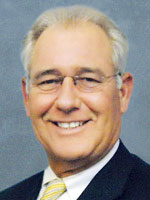 “The Senate however, was reluctant to take up my bills and amendments to see this effort through, and I regret that the importance and the need to pass this good piece of legislation was not acknowledged,” said Sen. Greg Evers, who represents the North Escambia area.
“The Senate however, was reluctant to take up my bills and amendments to see this effort through, and I regret that the importance and the need to pass this good piece of legislation was not acknowledged,” said Sen. Greg Evers, who represents the North Escambia area.
“In the end, the last measure to repeal the program mandating these inspections was not taken up in the Senate before Friday’s midnight deadline. Although my colleagues were unwilling to support the septic tank repeal at this time, I will keep fighting to reverse this law and I encourage you to keep fighting with me. This will remain my number one priority until we get it accomplished,” Evers said.
The Florida House passed a measure in mid-April to repeal the mandatory inspection law that was passed in 2010 as part of a broader springs protection bill. But the bill died in the Senate with the end of the session.
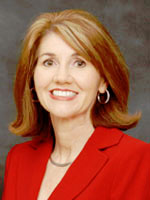 The House bill’s sponsor, Rep. Marti Coley, R-Marrianna, expressed her disappointment in a written statement early Saturday.
The House bill’s sponsor, Rep. Marti Coley, R-Marrianna, expressed her disappointment in a written statement early Saturday.
“I am very disappointed that the Senate chose not to repeal the septic tank inspection,” Coley said. “However, because of budgetary concerns, we added language in the implementing bill that requires the Department of Health to submit a plan which includes an estimate of agency workload and funding needs for approval by the Legislative Budget Commission.”
She said the health department will not be able to spend money to implement in the plan without the budget commission’s approval — potentially stymying the program until new measures to repeal the bill are considered in 2012.
 The law that requires for property owners to pay for inspections on the state’s 2.6 million septic tanks every five years went into effect January 1, but last fall the legislature delayed implementation until July 1 hoping for the repeal that did no happen this session.
The law that requires for property owners to pay for inspections on the state’s 2.6 million septic tanks every five years went into effect January 1, but last fall the legislature delayed implementation until July 1 hoping for the repeal that did no happen this session.
The septic tank inspection requirement, which opponents say could cost property owners $500 per inspection, was part of a larger environmental bill to improve water quality in Florida’s freshwater springs.
Weekend In Photos
May 9, 2011
From community festivals to theater productions to math tournaments and farmer’s markets, NorthEscambia.com had photo galleries this weekend with about 250 photos from across the area.
Click any of the items below to see more pictures.
Hot, Mostly Dry Week
May 9, 2011
Here is your official North Escambia area forecast:
- Monday: Mostly sunny, with a high near 90. Calm wind becoming south between 5 and 10 mph.
- Monday Night: Patchy fog after 1am. Otherwise, increasing clouds, with a low around 64. South wind between 5 and 10 mph becoming calm.
- Tuesday: Mostly cloudy through mid morning, then becoming sunny, with a high near 91. Calm wind becoming south between 5 and 10 mph.
- Tuesday Night: Patchy fog after 1am. Otherwise, partly cloudy, with a low around 63. South wind between 5 and 10 mph becoming calm.
- Wednesday: Sunny, with a high near 92. Calm wind becoming south between 5 and 10 mph.
- Wednesday Night: Patchy fog after 1am. Otherwise, partly cloudy, with a low around 65. South wind between 5 and 10 mph becoming calm.
- Thursday: Partly sunny, with a high near 89. Calm wind becoming south between 5 and 10 mph.
- Thursday Night: Mostly cloudy, with a low around 65. West wind between 5 and 10 mph.
- Friday: A 20 percent chance of showers and thunderstorms. Partly sunny, with a high near 88.
- Friday Night: Partly cloudy, with a low around 62.
- Saturday: A 20 percent chance of showers and thunderstorms. Partly sunny, with a high near 90.
- Saturday Night: A 20 percent chance of showers and thunderstorms. Mostly cloudy, with a low around 62.
- Sunday: A 30 percent chance of showers and thunderstorms. Partly sunny, with a high near 85.
Escambia County FFA Students Participate In Project
May 9, 2011
 The Escambia County FFA recently participated in the 2011 Gulf Coast Agriculture and Natural Resource Association project. FFA Chapters from across the School District of Escambia County took part in enriching student’s lives.
The Escambia County FFA recently participated in the 2011 Gulf Coast Agriculture and Natural Resource Association project. FFA Chapters from across the School District of Escambia County took part in enriching student’s lives.
The Gulf Coast Agriculture and Natural Resource Association, is an organization that is dedicated to enriching student’s lives through livestock projects. Student’s work with their local FFA advisors to learn as much as possible about agriculture through their projects. Many skills are acquired throughout this project including teamwork, commitment, and financial stewardship. Students spend many hours training for the show and receive assistance from their advisors, industry partners, alumni and community stakeholders.
The following students participated in this year’s show:
Northview High School
Allie Vidak
Jennifer Bladwin
Ashley Cunningham
Tate High School
Megan Gibbs
Emily Higdon
Victoria Bell
Tyler Knowles
Joshua Miller
Dyllan Brown
Kyle Livingston
Ernest Ward Middle School
Tabitha Chavers
Miranda Vidak
Austin Cunningham
Bellview Middle School
Donnie Dixon
Hanna Garrett
Virginia Montgomery
Ransom Middle School
Forrest Gibbs
Kindergarten Registration At Bratt, Molino Park Elementaries
May 9, 2011
Registration is underway for kindergarten at Bratt and Molino Park elementary schools.
Students must be age five before September 1, 2011 to register for the 2011-2012 school year. The student’s birth certificate, social security number and proof of residence (such as a power bill) are required at the time of registration. An immunization record and Florida physical are required by the first day of school.
Registration packets are available now at Bratt and Molino Park elementary schools. For more information, call Bratt at (850) 327-6137 or Molino Park at (850) 587-5265.
Ernest Ward Middle School Names Students Of The Month
May 9, 2011
Ernest Ward Middle School has named their Students of the Month for April. They are (L-R) James White, Courtney Weekley and Jon Michael Hart. Submitted photo for Northescambia.com, click to enlarge.
Earline White Howell
May 9, 2011
Ms. Earline White Howell, 63, passed away on Saturday, May 7, 2011, at a Pensacola hospital.
Ms. Howell was a native of Flomaton, a former resident of Molino, and a resident of McDavid for the past 12 years. She was an employee with Stone Container, battled cancer very courageously for 18 years and attended the Gospel Light Church. She was preceded in death by her parents, Narvie Lee and Agnes White, and a half-brother, James Graves.
She is survived by her son, Rodney Eugene Howell of Molino; her daughter, Robin Howell Cofield of McDavid; five grandchildren, Hunter Cofield, Levi Cofield, Josh Howell, David Thompson and Daniel Thompson; four great-grandchildren; two brothers, Buddy and Vernia White of Flomaton, and Donald and Dellene Graves of Gulfport; and three sisters, Louise Harwell of Century, Carolyn and Leslie Griffin of Windfield, LA, and Dorothy and Ralph Reed of Gautier.
Funeral services will be held Tuesday, May 10, 2011, at 4:00 p.m. at the Petty-Eastside Chapel Funeral Home with the Rev. Wayne Weekly officiating.
Burial will follow at Traveler’s Rest Cemetery.
Visitation will be held Monday, May 9, 2011, from 6:00 until 9:00 p.m. at the Petty-Eastside Chapel Funeral Home in Atmore.
‘Thank You Jesus’ – No Injuries in Bratt Wreck
May 8, 2011
“All Is Well. Thank You Jesus” — those were the words spray-painted on an overturned Chevrolet Blazer discovered this morning on Hanks Road near Pine Barren Road in Bratt.
There was no one around the vehicle when authorities responded. Using the vehicle’s registration information, they determined the Blazer’s owner lived a short distance away. They found the driver, 50-year old Juanita Fears, about to leave her home — and head to church.
Fears told authorities that she had fallen asleep on her way home earlier in the morning. She was not injured.
The accident is under investigation by the Florida Highway Patrol.
Pictured above: There were no injuries in this accident Sunday morning on Hanks Road in Bratt. NorthEscambia.com photo, click to enlarge.




